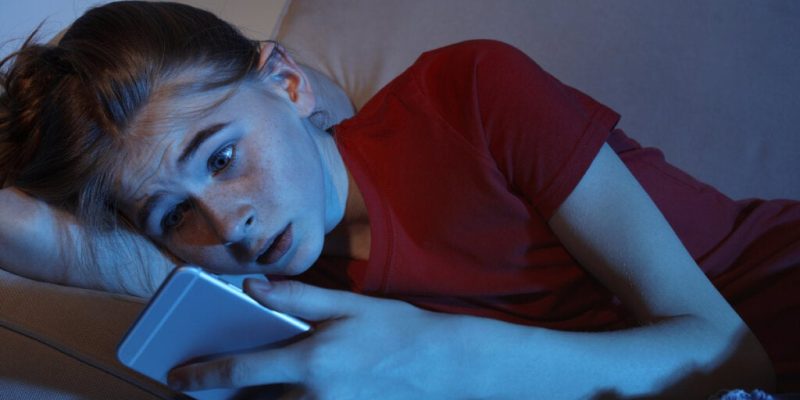Anxiety, sleep disorders, depression, and eating disorders (ED). According to a recent study, social media affects the mental health of girls to a greater extent than boys. The most striking – not to say shocking fact, is that – these problems appear between the ages of 11 and 13.
Our younger generations are more than just true digital natives. In fact, boys and girls between ten and 11 years old are becoming addicted to cell phones. Almost without realizing it, we’re offering them a powerful technological resource without first teaching them how to make good use of it. That’s the key and the real problem: the misuse of these devices.
It’s because we don’t supervise or educate them in an area that’s important for their social, mental, and emotional development. In fact, today, there are tweens who get very little sleep at night because they spend the night hours online.
A bad night’s rest added to other factors that we’ll analyze here as well, are affecting girls to a greater degree. Let’s take a look.
Facebook analysts have known for decades that Instagram could have a negative impact on teenage girls.
Social media affects the mental health of girls to a greater extent
The University of Essex and University College London published a study in The Lancet. The researchers provided evidence to support the hypothesis that social media affects the mental health of girls to a greater extent than boys. A similar investigation was conducted later in 2011 when Instagram was acquired by Facebook.
Mark Zuckerberg and his team wanted to know what impact the use of this platform could have on the population. The data obtained was kept secret until The Wall Street Journal published it (for its subscribers). In fact, META possessed data that supported the hypothesis that heavy use of Instagram causes adolescent girls to feel increasingly insecure and unhappy.
On average, girls between the ages of 11 and 13 spend much more time on social media than boys of the same ages. They tend to spend more time on video games than in spaces like Instagram or Tik Tok. However, after 14 the figures are equal.
They sleep fewer hours than necessary
The American Academy of Pediatrics establishes the following sleep guidelines for children and adolescents:
- Between six and 12 years old, it’s recommended that they sleep between nine and 12 hours a night.
- Between 13 and 18, they should sleep between eight and ten hours a night.
The research in The Lancet indicates that girls between the ages of 11 and 14 get between five and seven hours of sleep a night. That’s because they’re awake using social media. An investigation conducted by the University of the Witwatersrand in South Africa and the Center for Health Sciences claims that we’re neglecting insomnia in adolescents. Furthermore, this condition is linked to other problems, such as depression or systemic inflammation.
Girls who ‘learn’ early to hate their bodies
Can you ‘learn’ to hate your own body image? Yes, you can. In fact, today’s society continues to emphasize a distorted and harmful model of beauty. Consequently, from an early age, many girls develop bad relationships with their own bodies.
They reject their bodies because they don’t fit in with those supposedly ‘normative’ models that appear in advertising, social media, and the cinema. Between the ages of ten and 11, they exhibit body insecurity, thus rejecting a body that hasn’t even yet been developed. They see defects where there are none. Furthermore, they compare themselves with others and always perceive themselves as disadvantaged.
Online bullying
There’s another factor that explains why social media affects the mental health of girls to a greater extent than boys. more. This is the fact that girls also suffer online harassment to a greater degree than boys.
Cyberbullying and situations of online sexual harassment by adults are also situations in which girls are more vulnerable than boys. With the mental consequences that derive from it.
The more hours girls spend on social media, the more intense the depressive symptoms.
Social media affects the mental health of girls between 11 and 13 years old
Psychologists at the University of Essex and University College London found that girls aged between 11 to 13 reported more depressive symptoms due to heavy use of social media. From the age of 14, the data between boys and girls is equal.
Both sexes declare that they feel little satisfaction with life. In addition, girls under the age of 13 are more vulnerable to phenomena such as social comparison and online bullying. Lack of sleep is also a risk indicator for feelings of discouragement and burnout.
From the age of 14, if the use of social media occupies much of the time of adolescents, the risk of anxiety and depression is the same in both boys and girls. What’s most striking is that they haven’t even yet begun to live yet they don’t seem to have the desire to do so.

What can be done?
One revealing fact is that social media affects the mental health of girls more when they use it for more than five hours a day. Also, when they go to bed with their cell phones. So maybe this is the solution, to reduce their use of social media and prevent them from having their devices at night.
However, banning and restricting isn’t always the best strategy. The best option is to correctly educate children with regard to the digital universe, as it’s their way of discovering the world. A good use of social media means using it for as few hours a day as possible and applying critical thinking. After all, not everything that’s seen, said, and shown on that particular platform isn’t real or healthy.
The post Social Media Affects the Mental Health of Girls More Than Boys appeared first on Exploring your mind.



















Comments